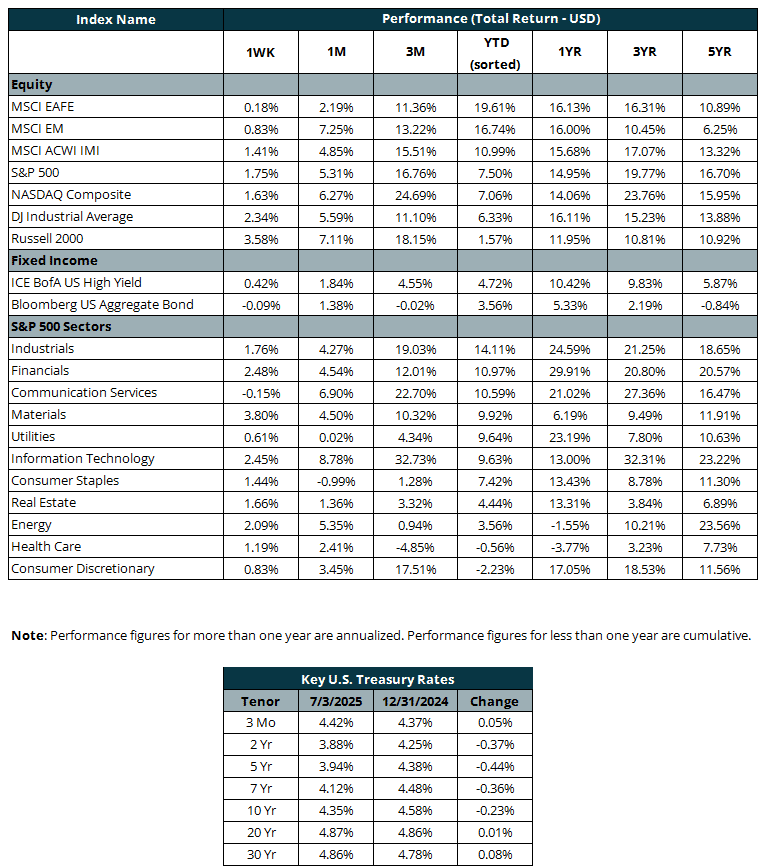‘One Big Beautiful Bill’ is Signed into Law

by Sequoia Financial Group

by Sequoia Financial Group
On the Fourth of July, the “One, Big, Beautiful Bill” was signed into law. The tax and spending bill makes the Tax Cuts and Jobs Act (TCJA) of 2017 permanent, adds new tax breaks, and cuts spending on many federal programs. A notable component of the bill was the State and Local Tax (SALT) deduction. The TCJA entitled taxpayers to a federal tax deduction of up to $10,000 for taxes paid to states and local municipalities. The new bill temporarily increases that limit to $40,000 until 2030, when it reverts to $10,000. Critics of the legislation argue that it disproportionately benefits higher income individuals. SALT is an itemized deduction, the benefits of which mostly accrue to high earners.
Regardless of the immediate winners, the Congressional Budget Office (CBO) exists to provide a non-partisan and objective long-term interpretation. The CBO projects the legislation will add $3.4 trillion to federal budget deficits. Bond investors reacted unfavorably: the yield on the 10-year Treasury closed on Thursday at 4.35%, up from a low of 4.19% earlier in the week. The Bloomberg US Corporate Bond Index (Agg), of which US Treasuries comprise 45%, ended the week down 0.1%. The Agg has nonetheless returned 3.5% this year.
The US labor market continues to defy traditional economic theory. Textbooks state a Fed rate-hiking cycle should trigger a recession, as companies borrow less and pull back on hiring. A recession has yet to materialize, however. In fact, the economy has shown remarkable strength. On Thursday, the US Bureau of Labor Statistics announced the addition of 147,000 jobs in June, higher than the 110,000 jobs expected. The unemployment rate also improved to 4.1% from 4.2%. An opposing view suggests headwinds, including tariffs, need more time to flow through the economy. Recent immigration crackdowns could also be driving favorable unemployment trends. With less people looking for work, less job growth is required to keep the unemployment rate stable. Indeed, the decline in the labor force participation rate (to 62.3% from 62.4%) indicates that fewer people were seeking employment.
With a potentially improving labor market, the S&P 500 advanced 1.8% during the week, bringing year-to-date returns to 7.5%. The index closed at 6,279, beating the record high of 6,117 it notched the week before. While many headwinds persist, earnings growth expectations remain strong. Analyst expectations of 11.5% earnings growth over the next year are higher than the 9.9% growth realized over the last 10 years. That strength could weaken, however, if the economics textbooks are correct about a deteriorating labor market.

The views expressed represent the opinion of Sequoia Financial Group. The views are subject to change and are not intended as a forecast or guarantee of future results. This material is for informational purposes only. It does not constitute investment advice and is not intended as an endorsement of any specific investment. Stated information is derived from proprietary and nonproprietary sources that have not been independently verified for accuracy or completeness. While Sequoia believes the information to be accurate and reliable, we do not claim or have responsibility for its completeness, accuracy, or reliability. Statements of future expectations, estimates, projections, and other forward-looking statements are based on available information and Sequoia’s view as of the time of these statements. Accordingly, such statements are inherently speculative as they are based on assumptions that may involve known and unknown risks and uncertainties. Actual results, performance or events may differ materially from those expressed or implied in such statements. Investing in equity securities involves risks, including the potential loss of principal. While equities may offer the potential for greater long-term growth than most debt securities, they generally have higher volatility. Past performance is not an indication of future results. Investment advisory services offered through Sequoia Financial Advisors, LLC, an SEC Registered Investment Advisor. Registration as an investment advisor does not imply a certain level of skill or training.









Stocks Extend Rally on Trade and Earnings Positives